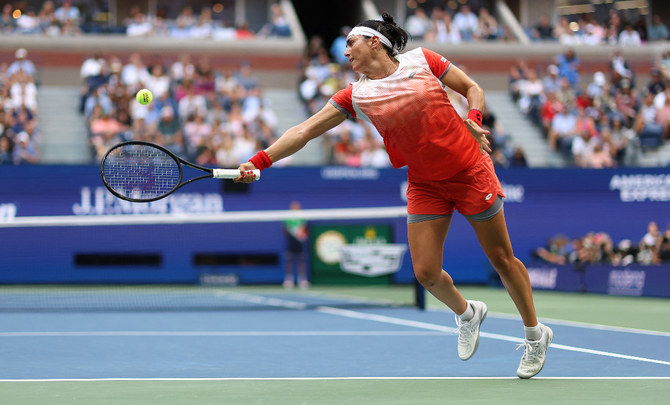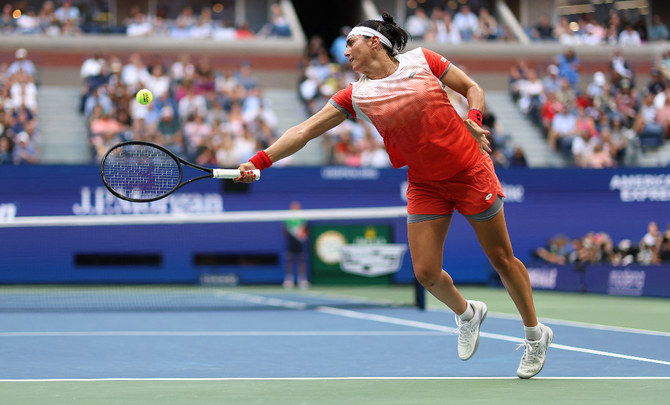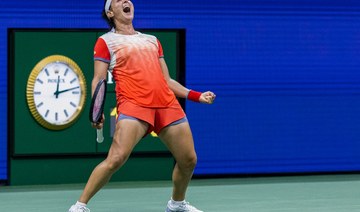As you can imagine, losing a second Grand Slam final is tough!
After the last point against Iga Swiatek, I just felt like I wanted to cry … a lot. I felt disappointed. I was trying to put my heart out there, but it wasn’t meant to be. It’s tough, you know? I was thinking like: “I just lost another final, again.” I was very, very upset about it. I was trying not to cry on court. Just a lot of emotions and I couldn’t wait to get out of there and hug my team.
I don’t know why but I was more nervous before this US Open final than I was before the Wimbledon one. Maybe because it’s New York, the energy here is different a little bit. I was nervous about the possibility of losing another final; suffering another disappointment scared me a little bit. But I faced that fear.
I know that I lost yet another final but I don’t regret much because I felt like I gave it my all. It’s just that the ball fell more for her because she played really amazing at certain times and it was very tough for me to counter her shots and trying to be ready for them. I gave it my all. I pulled off shots I never expected to pull off, pushed myself beyond my limits. I had to make some unbelievable winners to get back in the match.
Iga had an incredible start to the final, but usually, from experience, when someone plays really well, it’s very tough for them to maintain that level for two whole sets. So I was waiting for that moment, and I was also provoking it with some crazy shots that I had to really commit to and had to dig deep to land them.
Even statistics-wise, she had some crazy numbers, like 90 percent first serves in, 100 percent returns in. It’s insane, I’m not even sure if she put up numbers like that in other matches. But I started to let go, get freer with my shots, I started fighting back and when I came back, the crowd really helped also. It was really amazing. I kept telling myself: “Keep believing, you can still win it.” Hearing my team cheering for me helped me as well.
I saw Matthew Perry in the stands during the match, it was nice to see him, actually unbelievable. It just reminded me of the TV show, “Friends,” and it got me nostalgic a little bit on court. To go from me watching him on the show and him watching me right now … that’s really crazy!
I don’t know if I’ll cut myself some slack after this loss; I’ve always been hard on myself. I think I’m going to struggle for a few days but I’ll get back stronger, that’s something I know that is in me.
Right after the match, my coach Issam (Jellali) and my husband and fitness trainer Karim (Kamoun) were very, very positive. They told me not to cry, because I was sobbing, but I had to let out some of the emotions I was feeling. They were very supportive, telling me, listen, she played really good and we see you really trying. Issam saw some things in me he had never seen before these two weeks, so he’s very positive about it.
We started playing this tournament not knowing if we could really win a few matches and then we made it to the final, that’s what he was saying: “We keep building, you will take time, we know that.” But now at least he’s very happy with the level that I showed and he told me he discovered a lot of things in my game that he never saw before; that’s encouraging and hopefully we’re going to continue working more.
What Iga has done all season is really impressive. I’ve been saying it for a while now, if we want to be a strong group of top 10 players, I think we have to pull each other up and raise the bar high. Maybe I’m pulling some girls who are ranked behind me to do more, and Iga is doing the same. She’s a great role model for all of us definitely. If she keeps fighting hard, of course no one wants to let her with her intensity pull away from our level, we always want to keep her close. It’s very nice to have her setting the bar very high so we can catch up to her, and vice versa.
I genuinely believe, and have believed for a long time already, that I belong here, on the sport’s biggest stages. I feel like now it’s going to be tougher, the pressure is going to be more. I’m going to try to belong on these stages regularly. I’m going to grind for more and more, more quarterfinals, more semifinals, more finals. That’s the goal. But for now I’m just going to rest a little bit and we’ll think about those things later.
Now it’s time to celebrate what we’ve accomplished these past two weeks. We’re going for some karaoke maybe and have a nice dinner with my team, just to at least give ourselves good credit for this tournament, that’s very important. And from there we can move on.
*Ons Jabeur was talking to Reem Abulleil in New York after her US Open final against Iga Swiatek*













